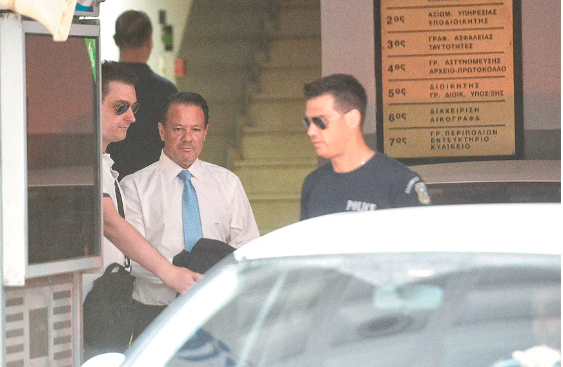A story, from the beginning of his career to his recent scandal, paints a picture of stark contradictions.
Hypocrisy Unveiled
A socially aware humanitarian by day and a brutal domestic abuser by night, Lytras represents a perplexing blend of incongruous traits. His public persona as a defender of the law sharply contrasts with his private life, where he committed severe criminal offenses. This duality was shockingly exposed when he savagely beat his wife, lawyer Sofia Polyzogopoulou.

Less than a year before the incident, Lytras appeared on the TV show “Mera Mesimeri” on the OPEN channel, vehemently condemning gender-based violence. He criticized a violent act against a woman in rural Greece, asserting that “not even the Taliban have such hatred for women.” He advocated for harsher sentences for domestic abusers and urged victims to report their abusers immediately.
A Career in Ruins
In June, the facade crumbled. Lytras, now held in the VIP section of Korydallos Prisons, has ample time to reflect on the stark difference between his public declarations and his private actions. His fall from grace serves as a cautionary tale about the perils of hypocrisy and the inevitable exposure of true character.
The Incident Involving Apostolos Lytras
On the evening of June 15, Apostolos Lytras and his wife were dining with friends at “Akti,” a restaurant in Vouliagmeni. Around 11:30 PM, a minor argument over a message she sent escalated. Lytras demanded to see the message, threatening to cause a scene. The tension was palpable to their friends, who discreetly ignored it.

Their relationship had been under strain, with Lytras becoming increasingly irritable. Despite his wealth and lack of financial pressures, stress, and past health issues seemed to affect him.
The couple left the restaurant separately to avoid further embarrassment. Once alone in the parking lot, the argument turned violent. Lytras punched his wife, breaking her nose and tearing out tufts of her hair. Despite her pleas to be taken to the hospital, he drove her home, 33 kilometers away, instead of the nearby Asclepeion Hospital in Voula.
Eventually, at 1:30 AM, he agreed to take her to a clinic in Ampelokipi, after she had changed out of her clothes that were filled with. The incident exposed the shocking duality of Lytras, a public advocate for women’s rights who privately abused his wife.
Confession and Apology
On Monday morning at the Evelpidon courthouse, Apostolos Lytras confessed after a lengthy interrogation, although his confession doesn’t negate the presumption of innocence. Despite his apology, the gravity of his actions—assaulting his wife—remains undiminished. His gun license was revoked, and his two legally owned pistols were confiscated. However, the investigator and prosecutor did not detain him, deeming him neither a flight risk nor a threat to repeat the offense or obstruct justice. He was released with conditions: moving out of their shared home, avoiding contact with his wife, and seeking psychological help.
His ex-wife, also a lawyer, had previously accused him of menacing behavior and filed a lawsuit, which she later dropped. Despite this, criminal proceedings for his actions against his current wife continue. No one is above the law, not even a prominent criminologist. Under the Floridis Criminal Code, he faces 5 to 20 years in prison. Meanwhile, the Athens Bar Association has initiated disciplinary action against him.
Professionally, Lytras is faltering, with his legal career in jeopardy and his Kolonaki law office underperforming. He released a statement pleading not to be judged on television and to respect his presumption of innocence. His colleagues criticize him for previously exploiting media sensationalism for self-promotion, now seeking ethical appeal only when convenient.

Behind the Public Persona: The Rise and Fall of Apostolos Lytras
Apostolos Lytras, a well-known criminologist born on October 5, 1972, in Athens, hails from Trikala, Thessaly, and grew up in Vrilissia. During his school years, he played football passionately, often neglecting his studies. Though he showed promise in football, his middle-class family encouraged him to study law. He attended the Law Department at the University of Macerata in Italy.
At 22, he suffered a traumatic shock when his best friend Nikos died in a car accident, for which Lytras, the driver, was not at fault.
Consequences and Reflections
Lytras’ case highlights the irony of a man who publicly championed women’s rights while privately violating them. His story has not only brought to light his hypocrisy but has also sparked broader conversations about domestic violence and the discrepancy between public personas and private lives.

Now, as he faces the consequences of his actions, Lytras must confront the reality of his dual existence—a reality that has profoundly affected his family, his career, and his reputation.
Ask me anything
Explore related questions





